Dangers and scam
Thailand is a wonderful country full of friendly people (except a few of them) but it is located in tropical zone. So if you live in a different climate zone, you may not know some specific information about tropics. I would be glad if you avoid all troubles that I’ve listed below. My task is to inform you about specific cases and not to make you scared of a journey to Thailand. So please keep it in your mind while reading.
I’m sure that you definitely know that walking in empty streets in the night (especially alone) is a bad idea. This chapter is dedicated to other less clear moments. If you haven’t been to Thailand, I highly recommend reading the whole chapter and continue reading the article about rules (there’s information not only about rules of behavior but about laws that can appear to be unexpected for you). If you have already been to Thailand – then I’ve prepared contents for you for quick navigation:
- Absence of insurance (and the way insurance works in Thailand)
- Sun
- Foodborne illness
- Heat illness
- Influence of tropical climate on the health
- Scratches and cuts
- Mosquitoes (Dengue fever)
- Rip current (must-read: it can save your life)
- Beaches
- Coconuts
- Vendors on the beach
- Jewels and jewelry
- Sidewalks
- Thefts / robberies
- Conflicts
- Scam (typical schemes)
- Motorbikes
- Dangerous animals
- Land mines
Absence of insurance
Remember: insurance is not a subject for saving money. You (or if you die, your relatives) will pay much more, when something happens. First of all medical services in Thailand are quite expensive (prices can be compared to the EU and the USA). Secondly repatriation of your body/ashes will cost several thousands of US dollars. Of course this will not matter to you anymore, but it can matter to your relatives: they can get into debts in order to have you buried at the nearby graveyard.
The way insurance works in Thailand
Your insurance should cover at least 30 000 USD. Insurance companies work only with certain hospitals, that’s why prior to making a visit to a hospital you should call your insurance company in order to ask which one hospital you can visit.
Check the conditions prior to buying insurance. Because there are 2 possible ways to interact with hospitals and the insurance company:
- service scheme, when insurance company pays directly to a hospital, and
- compensatory scheme, when you pay to a hospital, hospital provides you with documents and you present these documents to your insurance company in order to get paid money back.
Compensatory scheme is quite uncomfortable, it means that you should have enough money with you. And secondly some insurance company (at least in my country) like to “forget” about payouts. And you need to remind them of it over and aver again.
Most of insurances do not cover chronic diseases, sun burns and animal bites. And if your case seems to be disputable, I give 99% that you would be offered compensatory scheme, and no matter that you’ve signed service scheme.
Also you’ll definitely get compensatory scheme if your insurance contains a condition of deductible for each insurance case. F.e. besides of insurance cost you are obliged to pay 30-80 USD for each insurance case. It goes like this ‘cause insurance companies don’t wish to wait until you pay deductible.
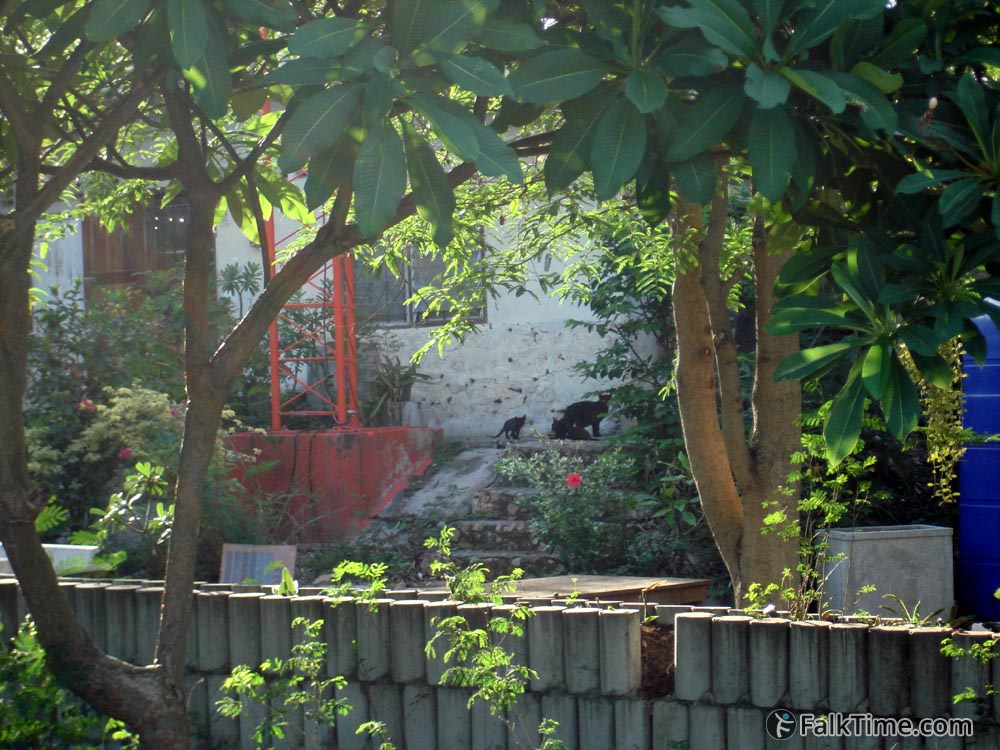
Sun
Dear friends in Thailand sun block won’t affect your sunbathing plans much. Your skin will definitely become darker, but a sun block will save your skin from sun burns. Remember that UV-rays easily go through clouds and the equator is near – it will take 20 minutes to become burned. Always apply sun block on all visible parts of skin and don’t forget to refresh it.
In order to understand what is waiting for you in Thailand, just take a brief look at UV-index. You can compare it to UV-index at your town, but make sure that it goes about sunny weather in forecast.

Food illness
When you have symptoms of food illness in Thailand, it doesn’t definitely mean that the food you’ve eaten was of poor quality.
- Some tourists begin to taste everything that they see. But the body was not adapted to some food. For example if you don’t eat seafood (especially different kinds of shellfish) at home, be careful with it.
- Some food may have laxative effect. F.e. if you eat too much of papaya at once, make sure that you don’t need to go somewhere today or tomorrow in the morning. Papaya’s effect can be compared to the effect of plums.
- If you feel sick, about to vomit and you’re shivering it can be heat illness (I’ll tell you about it more in the next paragraph).
Anyway one should be careful with food:
- All food should be cooked through. Feel free to ask vendor to heat ready-to-eat meat skewers one more time, it’s a common practise.
- You should definitely wash fruits. You can buy peeled and sliced fruits, they are safe (especially in hypermarkets) – just check whether they are freshly sliced. Eat fruits with a stick or wash your hands.
- Drink only bottled or previously boiled water. Some sources recommend excluding ice from drinks, but in my opinion in such a hot climate it’s impossible (and how can one refuse from fruit shakes?!). Anyway I’m still drinking water with ice in Thailand and I have never had any issues with my stomach.
- Restaurants. Well, on my first journey to Thailand I was warned that one should eat only where a tap with water is. But there are so many unique dishes that are cooked right in the street or sold from a food stall that you’ll never find in a restaurant! That’s why I recommend using your feelings: if you don’t feel safe/trust to a restaurant / food stall / whatever that sells food – don’t eat there. If you need logical arguments, then look at tables and tableware – they should be clean enough; estimate clients of this place – are there any? If all the visitors are tourists than it doesn’t mean anything. If there are a lot of locals, it can be a good choice.
The most important thing is to wash hands before eating or if there’s no possibility to wash hands – don’t touch food with your hands.
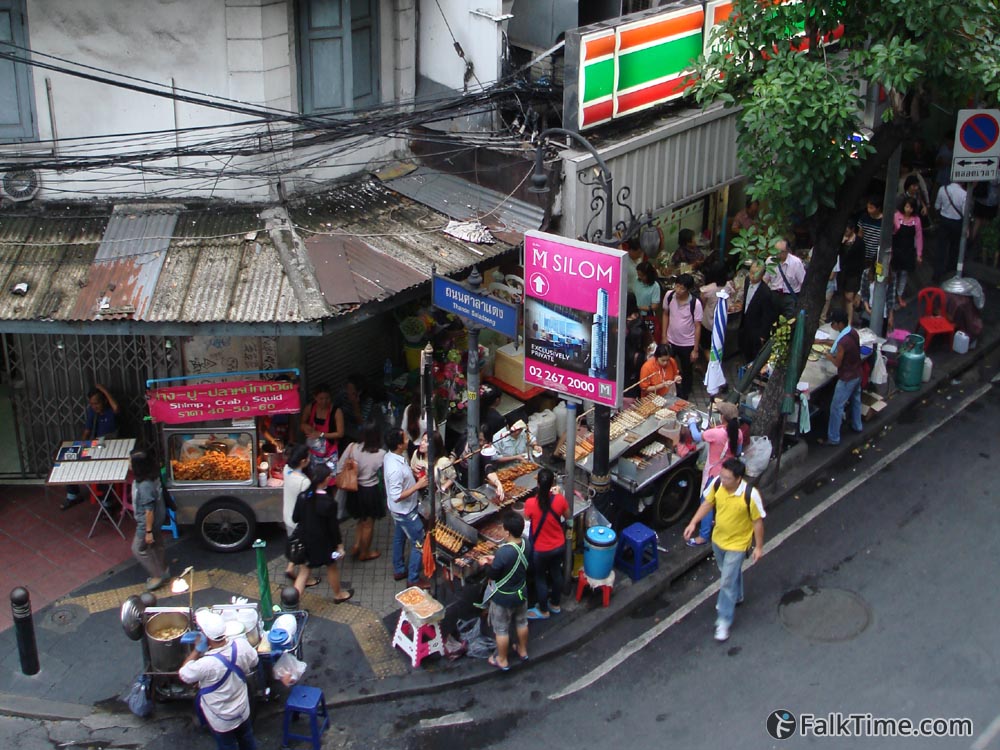
Heat illness
Heat illness is very insidious. If sun strike is easy to avoid – just wear any headwear and try to stay most of time in the shadow – heat illness comes unexpected. The reason is overheating of your body. And symptoms are very alike to food poisoning: you feel sick (about to vomit, but it doesn’t happen), you are very weak, unable (no will) to eat, you can only sip some water from time to time, also you may feel shiver. But this is the heat illness. In such bad condition you’ll spend 3-5 days. Is it worth it?
Take care of yourself and don’t let the heat illness get you in Thailand:
- Book only air-conditioned accommodation and don’t forget to turn the air-conditioner on.
- If you spend the whole day outside – make breaks and visit air-conditioned places (shops, shopping malls, cafes, restaurants, massage parlours etc).
- When you need to use transport longer that 1 hour, choose the air-conditioned one.
It’s better to dress up, if you feel cold, than to lose up to 5 days of your vacation, right?
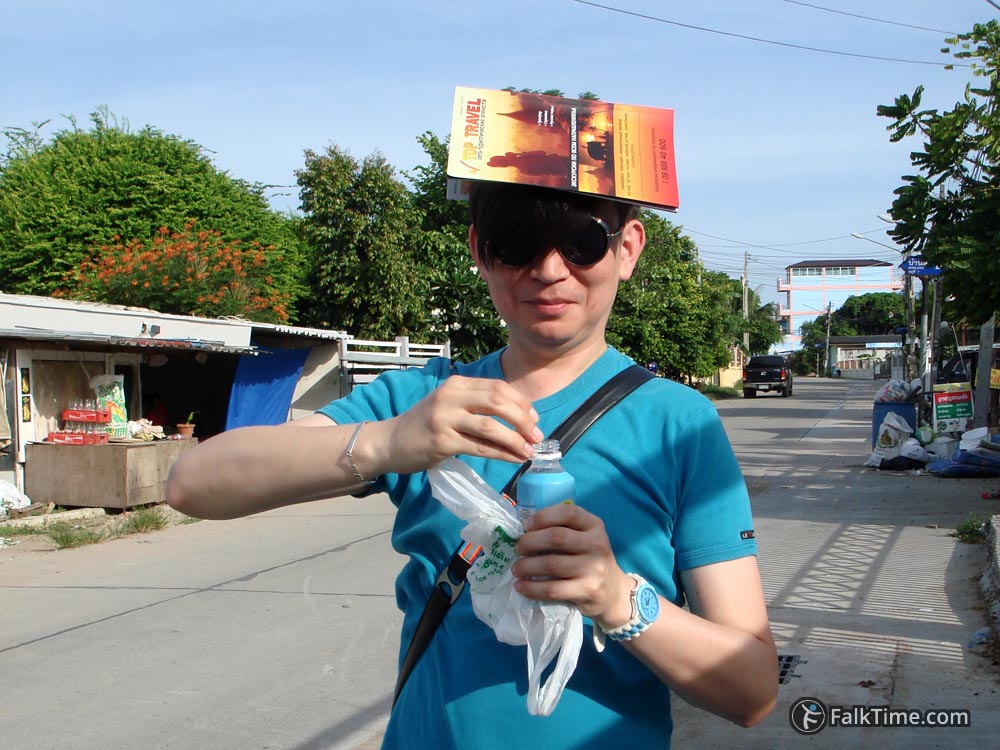
Influence of tropical climate on the health
Especially if you come from cold climate zone, your body may be not ready for such conditions. Hot and humid climate of Thailand puts under the risk people suffering from heart diseases, high blood pressure and some lung illnesses.
Even if you have great health, be attentive to the way you feel. Avoid high exercise stress. If you need some sport choose swimming. Running is not a good choice for sure. When you need more exercises choose air-conditioned gym instead of outdoor fitness.
Scratches and cuts
Even every little scratch or cut should be treated with antiseptic in Thailand. Many Russian people neglect it, because in our climate little wounds can be successfully healed by immunity. But in tropical Thai climate there’s a high risk of infection due to constant heat and high humidity. In good case you’ll get an inflammation, in worse – you’ll spend up to 3 weeks in a hospital fighting for your life. Be very attentive to little wounds while on vacation in Thailand.
Mosquitoes
Ordinary mosquitoes (that don’t transmit any diseases) in Thailand can bring more troubles than f.e. in Russia. So if you’ve detected a mosquito in your room, visit 7-11 and buy a repellent. I’ve been many times to Thailand and everything was ok. But in my last trip I got acute dermatitis from their bites somehow. A doctor took only a brief look at red spots on my body to diagnose it.
Russian (and European) repellents are too weak for Thai mosquitoes, you’d rather buy repellents in Thailand.
Dengue fever
Some species of mosquitoes transmit dengue virus. From one hand dengue fever is very rare especially in touristic places, from the other hand it’s a very serious disease: there’s no cure (you can only rely on your immunity and stay in hospital while doctors try to ease your condition) and no vaccine. That’s why I highly recommend using Thai repellents.

Rip current
80% of people have drowned because of the rip current. If you don’t want to follow them, please remember the information below.
Rip current is a stream that brings excess water from the coast back to the sea. It appears unexpectedly, which means that some of them you can see from the shore, while the other can form right next to you when you have already been swimming in the sea for an hour.

How to identify rip current stream
- It is perpendicular to the shore.
- Distinct difference from the rest of the sea surface: poppling water, white from the foam in it or vice versa – smooth surface. The stream can be darker, because the sea is deeper in this place.
- You can see movement in it – sea foam, sea plants and/or sand are moving direction deep sea.
- It can look like a “break” in the waves from 3 to 50 meters long.
- It will be in the place where waves of different directions meet.
It’s harder to distinguish the stream of rip current when the sea is stormy. Usually rip current can be met in shallow seas. So if you are only 1 meter deep in water, it doesn’t make you safe from a rip current.
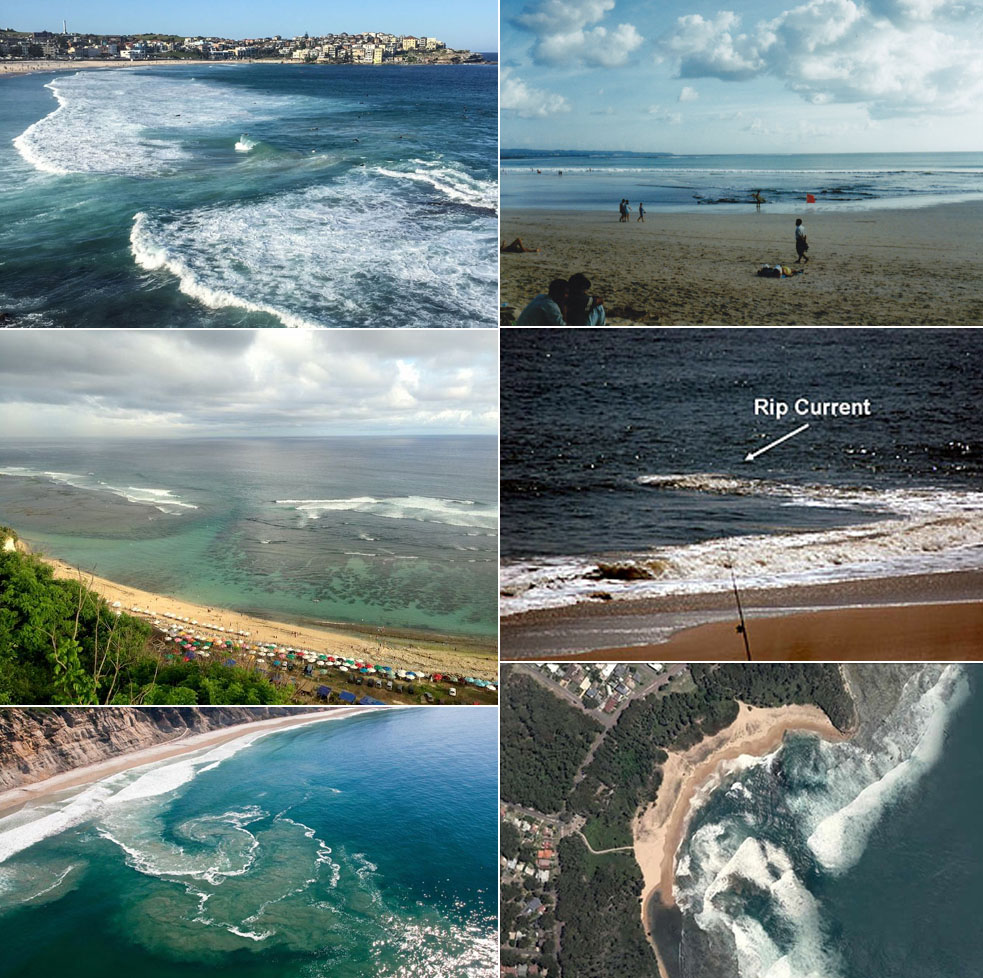
How to act if you are in a rip current
First of all – don’t panic and don’t try to resist it. Rip current won’t drag you down and won’t drag you too far.
Imagine that you are in a fast flowing river. Even if you are sportsman, you don’t have enough strength to swim against the stream – this is the way people die in rip current. Your task is to get out of this “river” into more quiet sea as soon as the speed slows down. You need to swim not against the stream but sideways, parallel to the shore / perpendicular to the stream:

If there’s a red flag on the beach and a sign “no swimming allowed”, it means that swimming is not allowed because of a real danger.
Note that in narrow straits (f.e. between 2 islands that are close to each other) there definitely will be a current. Even if the distance is small, it will be hard to reach as you will need to swim longer distance. Be careful, because no one knows how it may end.
Also I would like to remind that a person drowns silently, not the way it is shown in movies. Take care of your relatives and especially children.
Beaches
On beaches of Pattaya and some other resorts you will see special marked zones for swimming. If you don’t want a water scooter or a motor boat to run over your head, you’d rather swim only in these zones. They can be seen in Google maps if you turn on satellite view. I won’t mark them on my maps as their location is changing from time to time.
Most of Thai beaches offer comfortable sandy descent in the sea. But if the beach next to your hotel is rocky or there’s a coral reef – check closest local shops to buy swimming shoes.
I remind you: smoking on Thai beaches is prohibited.
Coconuts
Coconut palm trees are very common on beaches in Thailand. Yes, you got me right, if a 3-kilgram coconut lands on someone’s head, it will be a dead person. Please take care of you while walking next to coconut trees. They grow on beaches, along embankments (f.e. Beach road in Pattaya is full of palm trees), on coconut plantations and even in jungle. And never sit under coconut palms.

Vendors on the beach
There are a lot of vendors on touristic beaches in Thailand. With food everything is clear, while with souvenirs and jewels – no. The sun and heat affect brains badly, therefore I would advise to refuse to buy expensive things on a beach. You will either pay 2-5-10 times more or buy a fake.
Concerning souvenirs – at first check prices in Thai markets (for locals). And if you want to buy something pricey on a beach, don’t forget to haggle. Rarely but it may happen that one has no idea where to find such a nice thing in other place.
Jewels and jewelry
Thailand is not a place for showing off all of your beautiful and rare jewelry. It will only attract local thieves. So leave all your jewels at home. Bijouterie is a good choice for Thailand. Also you can buy it here, it is very cheap. F.e. I’ve seen earrings (10-30 THB) that were sold in Russia 10-20 times more expensive.
If you are interested in precious metals, choose shops otherwise there’s a high risk to buy a fake. A sale can be arranged in some shops in shopping centers (once I was lucky to visit one silver sale in Pattaya). Thai gold jewelry has different color due to other fineness. Especially it will be noticeable for Russians and Americans (as we got used to gold of 585 / 14K fineness).
With gemstone authenticity everything is worse than with precious metals. Don’t buy neither gemstones nor jewelry made of precious metals in the streets.
Sidewalks
Even in big cities like Pattaya or Bangkok you will find pavements only in 70% of streets. Most of them will be narrow and in some places they will be occupied with restaurant tables, shops counters or stalls.
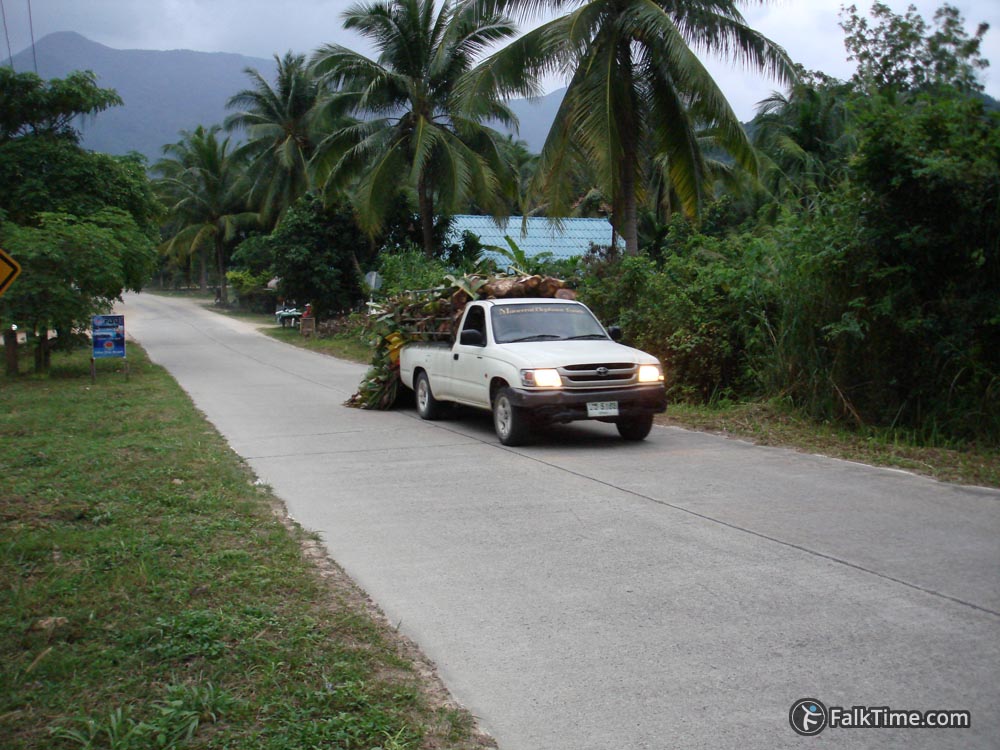
Thefts / robberies
In a room of a hotel located in touristic area there can be a safe (also it can be at reception desk) – ask the staff to explain you how to use it. Unfortunately most of safes are so small that even a netbook can’t fit in there. And some say that even a safe can be not safe enough. Nevertheless keep passports, tickets and money there. Bring with you around only insurance and a copy of your passport.
Precautionary measures:
- Don’t leave your belongings unattended.
- Don’t carry a bag on a shoulder that faces carriageway – a motorcyclist can rip it off your shoulder.
- Leave expensive jewelry at home, don’t bring it to Thailand.
- Avoid showing (explaining) that you use expensive devices.
- Pickpockets work in crowdy (especially touristic) places.
Conflicts
Do all your best to avoid conflict – smile to each other and leave. Thais try to act this way. But if the conflict did happen, be ready that Thais generally will stand up for their nationals, even when they are not right.
You should call tourist police (1155), because ordinary policemen almost don’t speak English and can get you wrong. And as a result they will stand up for Thais.
Avoid fights: don’t provoke and don’t react at the provocation. Fights in a foreign country (where fierce Thai boxing is the national martial art) is the last thing one should do. And don’t be fooled by Thai bodies being smaller than yours – it’s about genes and doesn’t reflect the level of their fighting skills.

Scam
– Thais are friendly but usually they won’t contact you first. If a Thai national has approached you, he’s talkative and offers you something, in most cases it’s about a scam. Foreigners living in Thailand can be also involved. Just be careful. If we speak of tourists – don’t let them to convince you to do something that is forbidden in Thailand together. They can be so self-confident because they just don’t know about the way it goes in Thailand.
– Typical scam of tuk-tuk drivers in Bangkok: “Where do you go? Really? Don’t you know that it is closed today? Let me take you to … ”. In fact everything is open. It’s tuk-tuk driver who wants to earn some money by cheating you. Other scam schemes that concern Thai transport we’ve been discussing in articles about transport.
– Ask about prices prior to ordering a dish / getting into a taxi / getting a service. Prices for the seafood can be shown per 100 g. Next to Walking street in Pattaya (and not only there!) there are bars that you will enter for free, but when you want to leave, it will appear that you have to pay fantastic bills (for watching the “show” and a menu without prices gives a lot of space for greediness). About scam schemes that concern 18+ category of issues you can read here.
– Tailoring a suit (in touristic places there’s a huge amount of Indian tailors) can be a good deal, some tourists bring from Thailand classy clothes sewed for little money. Or it can be a scam. The scheme is that you make a prepayment and the day you are leaving Thailand you receive ugly suit of very poor quality. In any case if you make prepayment, you should get a receipt, otherwise the police won’t be able to help you. Break their scheme using their methods: right from the start tell a tailor that you leave in 1 week (and not 2). 😉
I won’t describe the most common scam schemes around the world; they are well-known to everybody and do exist in Thailand too. Just remember that if you see someone losing a purse, forgetting credit card in ATM or suspicious bags – don’t touch it, tell about it to a policeman or to locals. Protect yourself from being accused of stealing.
Rental of a motorbike / water scooter / bicycle etc.
The scam with rentals usually is based on the idea that you rent a shabby vehicle and when you return it, you become accused of scratching (or whatever) this “wonderful new” vehicle. So the owner demands money / refuses to return deposit
Make a rule to examine the vehicle thoroughly prior to signing a treaty. Make pictures of every little scratch and point at it to the owner. Let him start the engine himself – to show you that everything is in order.
Don’t sign a treaty without exact amounts that you will have to pay if something happens.
If you are asked to leave your passport as a deposit – leave this rental instead of your passport. I give 99% that they are scammers.
If something happened to a rented vehicle, find out the price of repair (new vehicle) in the nearest service point (shop) first. New motorbike costs 16 000 – 30 000 THB while dishonest owner can require much more.
If the dialogue starts to remind of a robbery – call the tourist police yourself (1155). This way you can avoid the show with a fake policeman, or protect yourself from misunderstanding of ordinary policemen that don’t know English language well enough (due to it they can support the version of locals by mistake).
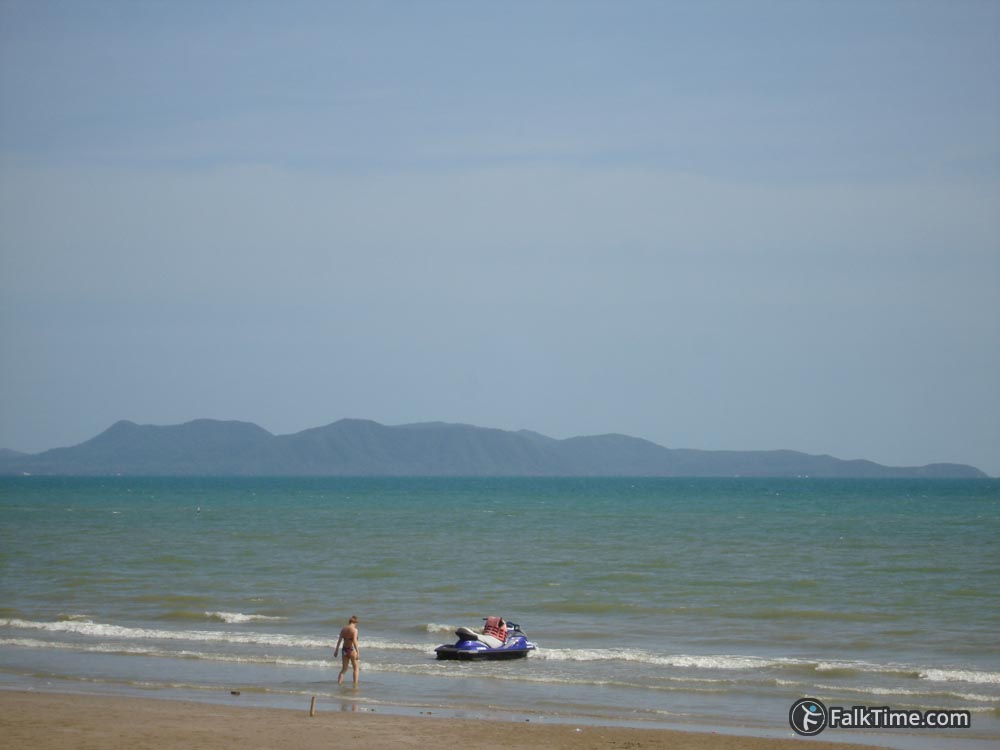
Motorbikes – a threat to everyone
First of all motorbike drivers drive anywhere they want and the way they want. They don’t care about traffic code, if there are no policemen around. Motorbikers in Thailand can drive on a pavement, on an oncoming lane and don’t care much about what’s going on around them.
Threat for pedestrians
Even when you’re crossing the street with the green traffic light on, beware of motorbikes – if cars have stopped to let you cross, it doesn’t mean that a motorbike will stop also.
Threat for car drivers
One of the most disappointing things is when a motorcyclist occasionally smashes your sideview mirror and quickly slips away. Last time when I was renting a car, the staff underlined that if my car would crash, I would pay only 5 000 THB (deductible), while if the side mirror would be broken – it wouldn’t be covered by insurance company.
From one hand motorcyclists are the same drivers with the same rights, from the other hand they always try to sneak between cars. And motorbikes can be hit very easy, and as they have only 2 wheels – it will turn into your ticket to a court hearing.
The third moment is that every car has blind spots – if you can loose sight of a car, should I mention about tiny motorbikes? Be very attentive while driving a car in Thailand. Even when an accident (car+motorbike) occurs at a speed of 40 km per hour, it can be fatal for motorbike driver and passengers.
For those who decided to rent a motorbike
- Always wear a helmet (motorbike rentals should provide you with it).
- Don’t take more than 1 passenger. F.e. in Pattaya and Phuket helmets and amount of passengers are regularly checked by traffic police.
- Observe traffic regulations.
- Remember that cars have blind spots, and a driver sometimes may not see you – try to think for him/her. Be very careful with just parked cars – you never know, when car driver will open the door.
- Hold the steering wheel with both hands.
- If it starts to rain, you have no other choice – stop and hide or get wet.
Like Russian embassy in Thailand I highly do not recommend renting a motorbike. Think of renting a car, in Thailand it would be safer for you – at least you will have more chances to survive after an accident. While the safest idea would be to use public transportation or grab a taxi.
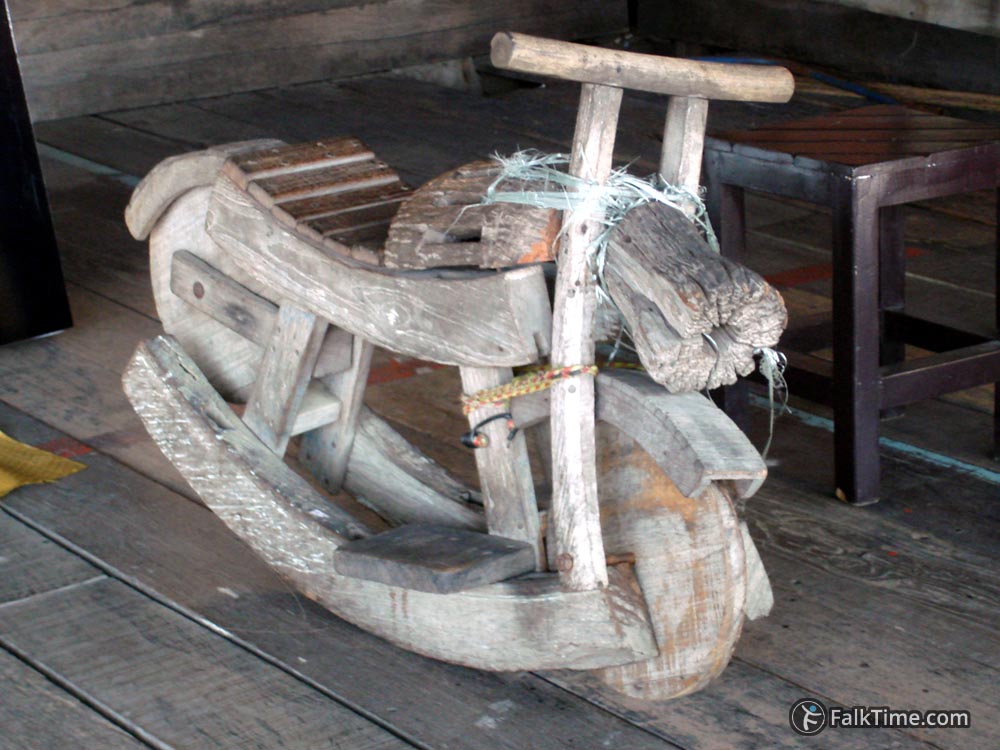
Dangerous animals in Thailand
The main rule for a tourist visiting Thailand (especially if you don’t live in a tropical country) is not to touch any animals, insects, unknown plants etc. Besides of what I will tell you now I’ve got an article concerning visits to national parks, it will give you some more information about Thai wildlife.
Dear friends, if you want to feed exotic animals, plan a visit to Thai zoo. They have a great choice – giraffes, hippos, deer and many others. But if you are relaxing on a beach and a Thai national approaches you with an elephant or a poor loris and offers you to make pictures or feed an animal – don’t support / encourage the mockery, refuse from these services.
I’ll tell you about elephants in the article devoted to them. And now I will explain about slow lorises: before this owner received the animal, sharp teeth of loris were pulled out. And now these nocturnal animals have to suffer from daylight as they are carried back and forth along the beach. Lorises hate being touched, but there’s a line of tourists that take them in order to get exotic photo. And when they raise their hands (lorises do have little hands like humans) – it’s not sweet as one may think, it’s the last try to defend themselves from you. Furthermore slow lorises do not do well in captivity as it’s impossible to give them even minimum care they need. The only way to decrease their sufferings is to reduce demand on such services.
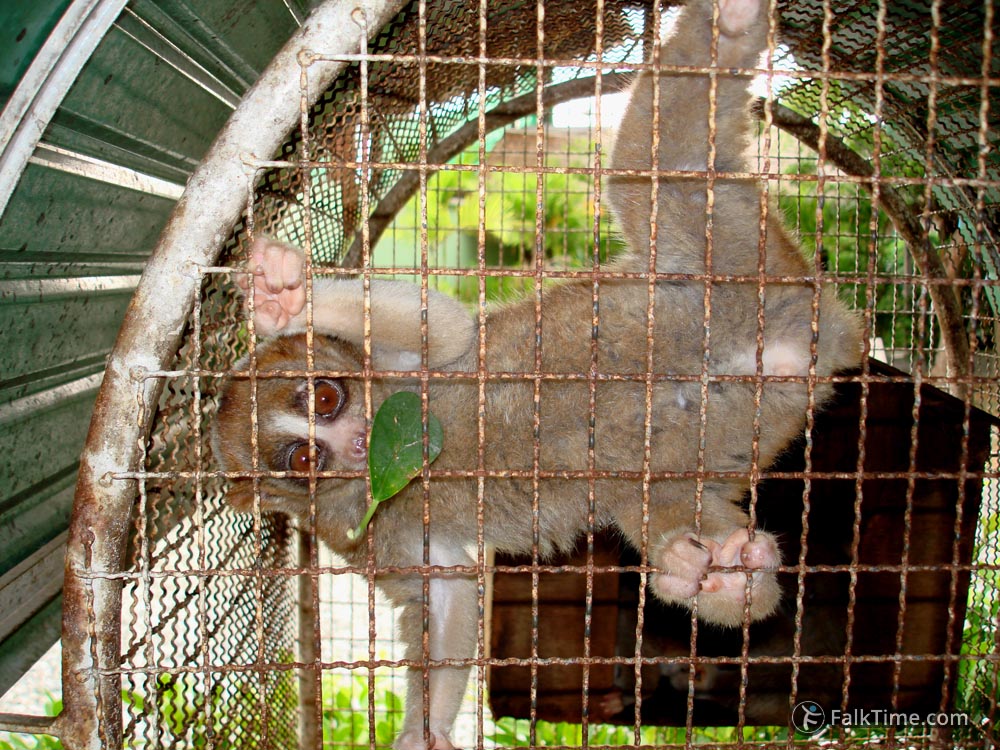
Monkeys
Unfortunately most of people that live in countries uninhabited by monkeys tend to think that these animals are not dangerous. We got used to trained monkeys in a circus or on a beach, or to those that live in a zoo. We have no other monkeys around us.
A monkey is a predator with fangs not shorter than by a dog while a monkey is more sly and insolent. I mean monkeys that live next to humans. They live in flocks and it makes the situation even more dangerous, first of all there are always any babies, it means that if something happens the whole flock can attack you. Secondly monkeys feel themselves this way more safe and strong – they can easily wrest something from you (food or your bag with a passport inside or a camera).
If you see monkeys – don’t approach for the sake of your safety.
When you’ve decided to watch them, make sure that they are far enough from you and not watching you from the nearest roof or tree. I feel myself safer, when there are some local Thais next to me (I underline – local, because these people know how to help you, if monkeys try to attack or rob you). And yes, there were some cases in my travel experience when I had decided to give up my plans to visit a sight because it was overcrowded by monkeys.
In Thai national parks you will meet “noble” (as I call them) monkeys that would stay away from you. Nevertheless they are wild animals and one should avoid any contacts with them. Firstly don’t feed them – because later they will try to come closer to roads and die hit by cars even in a national park. Secondly they can get you wrong and bite you. Thirdly you’ll be fined by park rangers.
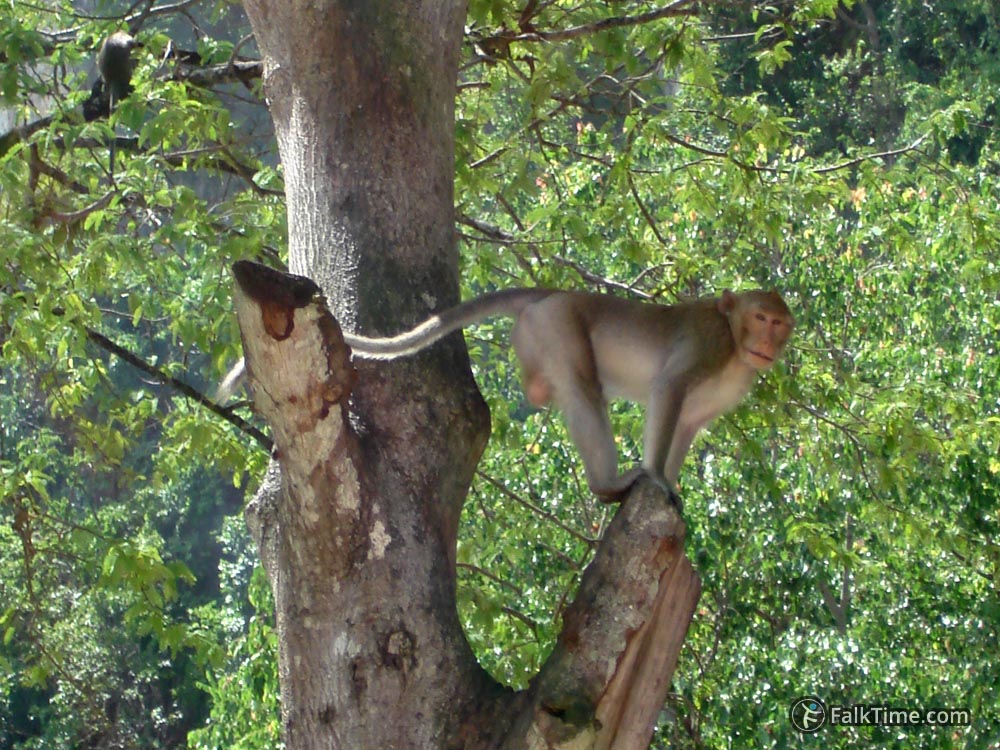
Homeless dogs
Usually are dangerous when they are several and you are alone. Of course they can be friendly, but if you see more than 5 dogs together, you’d rather change your direction – cross the street if it’s wide or choose another lane if it’s narrow.
Choosing insurance check whether animal bites are covered. If your buy a tour to Thailand from agency, check insurance also, so you wouldn’t be unpleasantly surprised later.

Insects and snakes
There’s a big variety of insects in Thailand, because they have no need to hibernate in winter. Definitely avoid bigger ones. I have mentioned mosquitoes here, and about insects that may disturb you in a hotel I’ve wrote in the article about accommodation.
Also there are many kinds of snakes in Thailand. That’s why you should look under your feet (where you step), especially in parks and gardens. Snakes generally don’t attack humans on their own initiative. If someone was bitten by a snake, remember how it did look (make a picture) – because multipurpose antidote (suitable for every snake poison) doesn’t exist. And drive him to a hospital as soon as possible.

Also be careful with frogs, as there are some beautiful but poisonous species in Thailand.
Sea creatures
Generally I start swimming as soon as I get in the water and I always look around when I swim – probably that’s the reason why I still have had no issues with sea inhabitants. But Thailand is surrounded with tropical seas and it means that many creatures live there.
At low tide put any shoes or at least slippers on, if you want to explore bare sea bottom.
Also you should know that you are not allowed to feed sea inhabitants – otherwise you’ll be fined (up to 100 000 THB) and/or imprisoned (up to 1 year).
Don’t confuse sea fish with freshwater species. In order to make you wonder on a tour along Chao Phraya river in Bangkok Thais will give you some bread for big and numerous fishes. And even next to the entrance of national park “Namtok Phlio” you can buy some green beans to feed soro brook carps.
Portuguese man o’ war and box jellyfish
All of these marine creatures are the most dangerous. They are rare guests on beaches of Thailand, nevertheless in September of 2016 4 beaches of Phuket were temporary closed due to their arrival. Some say it happens only once per several years and usually during wet season (from May to October).
If you’ve been stung by a jellyfish, don’t panic and start slowly (to avoid further burns) moving direction the coast. You should go out of the water as poison of these species has paralytic effect. Visit a doctor. Avoid touching burns with bare hands or you may get burns. If you wish to wash remains off a burn, use sea water (Thais also use 6% vinegar and lime juice, but it doesn’t work with venom of some jellyfish; avoid fresh water as it will worsen your condition).

Sea urchins
The main risk with a sea urchin is to step on it – fragile needles pierce the foot, break and stay inside. If it did happen, immediately go out of the sea and contact the doctor. Venom (if the sea urchin was venomous) is too weak for a human, but it can cause allergy issues. The next task is to get rid of needles in your foot. Otherwise you’ll get suppuration. In my opinion one should delegate this procedure to a doctor.
Dangerous sea inhabitants by coral reefs
Cone snail
If you disturb a beautiful poisonous snail, it will definitely attack you with its harpoon-like tooth and inject you very strong neurotoxin that can kill a man. Generally this way cone snails hunt for fish. Note that there are no specific drugs for the treatment of cone bite’s consequences.
Cones inhabit coral reefs but they can also be found between rocks. The most venomous is the geography cone. Such a 5-16 cm long shell can cost you a life:

Stonefish and scorpion fish
These poisonous fishes are not the fast swimmers, so they prefer to lay down on sea bottom, pretend as if they were stones and wait for a prey. They are rarely met in Thailand and generally they party around coral reef.
Their dorsal is equipped with sharp needles that are so strong that they can even pierce footwear through. And a stonefish raises its dorsal as soon as it begins to worry. If one was pricked by a stone or scorpion fish, one has only a few hours to be delivered to a hospital.

Whiptail stingray
Another one rare guy that relaxes and hides in the sand of sea bottom. As a matter of self-defense this stingray uses his tail that is equipped with ~10 cm spike strong enough to pierce through even leather shoes. Whiptail stingray’s venom is very strong.

Probably one of reasons why I prefer to start swimming as soon as it is possible.
Moray eels
There are not so many moray eels in Andaman Sea and in gulf of Siam as in Red or Mediterranean seas, but they exist. They spend daytime calmly sitting between rocks or coral reefs (while in the night they come out to hunt). Nevertheless moray eels have sharp teeth, so avoid provoking them.
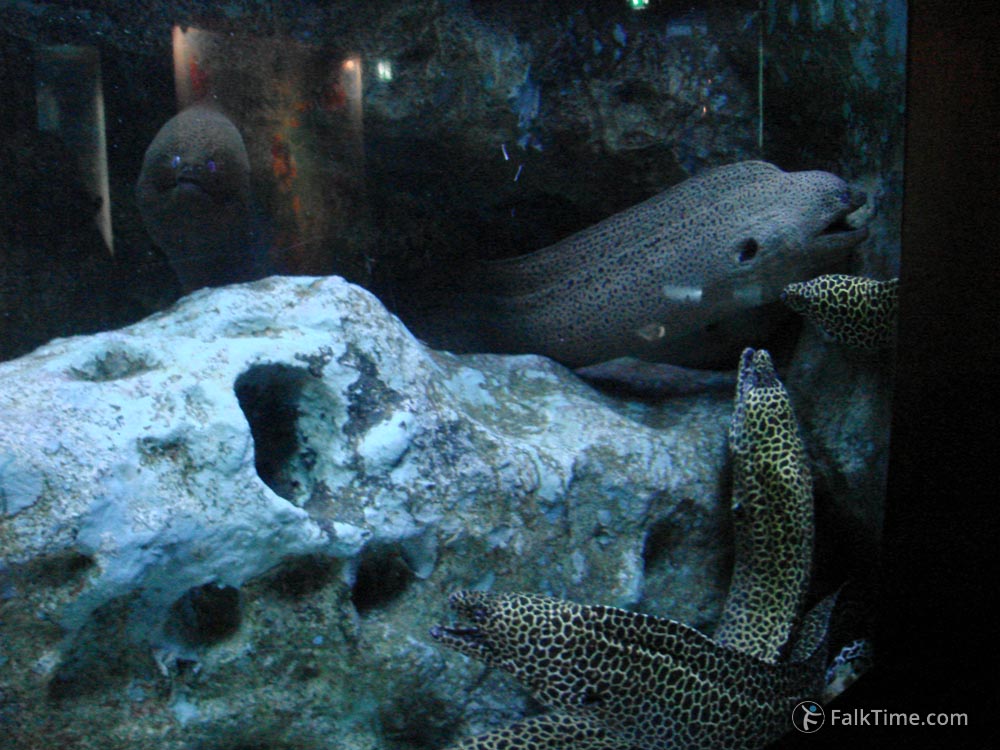
Corals
Don’t touch corals or you get burned or cut. Avoid swimming too close to corals, keep the distance. If you got burned by a coral, contact doctor as soon as possible, because right treatment can reduce the time of healing.
Export of unmanufactured corals and shells from Thailand is prohibited.
Conclusions
– You’d rather avoid swimming in the night in Thailand. Firstly you don’t see where you head, secondly some sea creatures (f.e. box jellyfish) are attracted by the light, if there are any lights at the beach you are under risk of meeting them.
– You’ve got more chances to encounter jellyfish and other marine fauna at low tide.
– Don’t try to touch unknown sea creatures. Not only bright-coloured can be venomous.
– Don’t catch and kill sea creatures.
Land mines
Most of the forests next to Thailand borders are still full of land mines. The echo of former military conflicts. Thais are solving this problem but it requires much time – f.e. the territory of Sadok Kok Thom (Khmer temple) was cleared of mines only in 2004.
For 2018 the area of 409 km2 remains mined in Thailand.
If you happen to be next to any Thai border (especially with Cambodia), be extremely attentive and don’t walk in jungles. Mines are still dangerous and they harm/kill both people and heavy wild animals (like elephants).

Sources of non-watermarked pictures are Gismeteo and Wikipedia.




